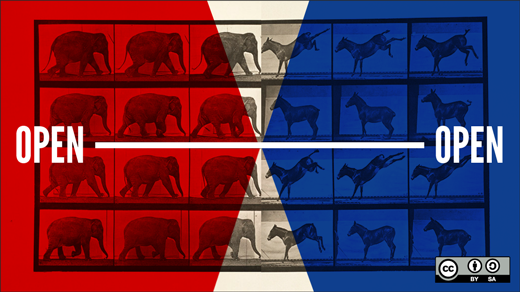You want to get more involved with your government, but the red tape and politics are overwhelming. Maybe you just want "the facts" to make your own informed decision. This is where start-up project EveryVote comes in. This is not an open source electronic voting project. EveryVote wants to encourage citizens to take a more active and informed role in their government.
We caught up with some of the project team based out of Northern Illinois University to find out more. Mitch Downey, co-founder and user experience developer; Vincent Schramer, co-founder and application developer; Kevin Hoople, application developer; Derick Downey, multimedia specialist; and Steve Mac, graphic designer answered some of our questions about their project.
If you're at Transparency Camp this weekend in DC, go meet the team. If not, read on to see what EveryVote is all about and how you can get involved.
Tell our readers what EveryVote.org is.
EveryVote.org is a web platform beginning development that will help people take a more active and informed role in their governments or organizations. It will be an open source, non-profit, civic engagement social network platform. EveryVote strives to be a comprehensive yet easy-to-use hub of the Internet's best civic engagement tools and resources.
It will debut containing all the legislative and electoral data of the US Congress available online, but any user can add a governing body with its own rules, procedures, and data to EveryVote and make use of the platform's utilities.
After a user signs up for an EveryVote profile, it enables the person to state support or opposition to not only bills, officials, and candidates, but also other users and groups. As a user browses the site, EveryVote automatically compares that user's voting record to the records of officials, candidates, other users, and groups, and displays the result as a % correlation next to that person or group's profile picture.
On the bills page, users can learn instantly how the people and groups they support or oppose are voting on that issue. For example, if 8 of 10 groups a user supports are voting in favor of a bill, the groups/supports databox would display a green +80%; if the same amount were voting against, it would display a red -80%.
EveryVote helps users participate in elections by providing them with an easy to scan candidate display, helping users register to vote, and sending reminders of registration deadlines and election days.
It even assists users who would like to run for office themselves, explaining the requirements and procedures required to run for that office, adding their profiles to their districts' election pages, helping them coordinate with volunteers, and linking users to make campaign donations on their EveryVote profile.
EveryVote will have full social network functionality (friend requests, event invitations, messaging, etc.), optional cross-functionality with Facebook wherever possible, and free app versions for mobile devices.
It will also have a democratically driven social news aggregation platform, similar to a platform like reddit. But unlike reddit, EveryVote will give users the ability to view only votes from supporters, opposers, or undecideds of that bill, person, or group.
Lastly, since EveryVote is open source and encourages users to design and share their own apps for others to customize their browsing experience, we like to think there's no limit to how a platform like EveryVote can help people.
EveryVote is currently in development, and you're looking for volunteers. What sort of help are you looking for?
Right now we're looking for developers, web designers, and graphic designers, especially those with previous experience working on civic engagement and social network platforms. As development progresses, we'd also appreciate help from political scientists, statisticians, public relations specialists, and really anyone who'd like to contribute to EveryVote's development.
If we are fortunate enough to receive sufficient grant funding or donations, we would like to expedite the site's completion by hiring a professional development team.
What are the civic benefits that you see EveryVote.org providing?
We see EveryVote encouraging civic engagement in a variety of forms. It will help users participate in elections, encourage civil discourse, and facilitate democratic processes. Since users can add their own governing bodies and manage their legislative and electoral processes through EveryVote, the site can promote democratic collaboration for organizations of all kinds.
We also believe it has educational value, as students could use the EveryVote platform to manage their school's student council or mock government for a class activity.
What other open source and open government organizations are you working with to collaborate on this project?
EveryVote isn't formally collaborating with any open source or open government organizations at this time, but we'd love to collaborate with any organization that has experience facilitating civic engagement on the Internet. We are definitely dependent on other organizations however, as for the US version of EveryVote we are planning on using the great API resources freely available from the Sunlight Foundation, GovTrack, Maplight, and other sites.
In the past couple weeks, we have submitted introductions to the EveryVote project to Stanford's Liberation Technologies listserv, Sunlight Labs message board, and Steven Clift kindly a posted an introduction on his Newswire listserv. The response EveryVote has received has been very encouraging, but we have no formal collaborations at this time.
We understand you'll be at Transparency Camp in Washington, DC on April 28. What are you looking to accomplish at the camp?
Our plan for attending Transparency Camp is to:
- Learn as much as we can about open government initiatives
- Introduce people to the EveryVote project
- Give a presentation
- Talk with prospective volunteers
- Find information on grant funding opportunities
- Meet interesting people
- Have fun :D






1 Comment